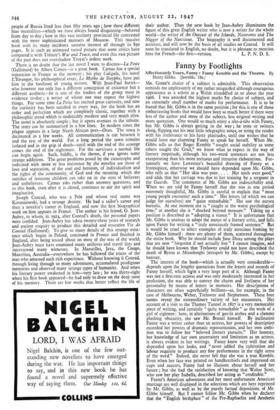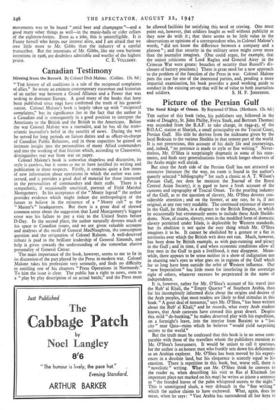Fanny by Footlights
MR. Gleas's choice of a subject is admirable. This observation reminds me unpleasantly of my rather misguided although courageous appearance as a soloist at a Welsh eisteddfod in or about the year 1906. I was awarded the highest marks for choice of subject, and an extremely small number of marks for performance. It is to be feared that Mr. Gibbs is in the same position ; for this is one of those embarrassing books that would have been so much better if there were less of the author and more of the subject, less original writing and more quotation. One would so much enjoy a tete-a-tete with Fanny, but Mr. Gibbs is always getting in the way ; he trots or twitters along, flipping out his neat little telegraphic notes, or tiring the reader with his irrelevance or his fusty platitudes, until one wishes that he would leave our charming Fanny to speak for herself. When Mr. Gibbs tells us that Roger Kemble " sought social stability as some others sought the Grail," we know what to expect in the way of literary ineptitude, although his two-word sentences are not less exasperating than his more tortuous and intrusive elaborations. For- tunately we have Lawrence's beautiful drawing of Fanny as a frontispiece, otherwise we should have depended upon Mr. Gibbs, who tells us that " Her skin was poor. . . . Her teeth were good," and adds that her carriage was due to her training by a sergeant in the Guards. The comments of Mr. Gibbs are indescribably arid. When we are told by Fanny herself that she was at one period extremely thoughtful, Mr. Gibbs is careful to explain that " most young people encounter such a time." Her letters (of which we can judge for ourselves) are " quite remarkable." She saw the aurora borealis. At one moment she is " caught at the worst psychological time," at another she is " shocked beyond measure." Taking up a position is described as " adopting a stance." It is unfortunate that Mr. Gibbs is anxious to adopt the stance of a literary critic, and falls upon Fanny for writing a " truly atrociously framed sentence." But it would be cruel to select examples of truly atrocious framing by Mr, Gibbs himself : there are plenty of them, scattered throughout the entire book. Why he should include lane Shore among the plays that are now " forgotten if not actually lost " I cannot imagine, and he should have known that Trelawny could not have described the death of Byron at Missolonghi (misspelt by Mr. Gibbs), except by hearsay.
The interest of the book—which is actually very considerable— depends upon the lengthy quotations from the letters and records of Fanny herself, which fojm a very large part of it. Although Fanny was not a first-rate actress and was only moderately interested in her profession, she was able to convey the charm and liveliness of her personality by means of letters or memoirs. Her descriptions of characters are often superficially brilliant—as, for example, in the case of Melbourne, Weber, Trelawny and Stephenson. These four names reveal the extraordinary variety of her encounters. Her account of a visit to the Thames Tunnel in 1827 is a very memorable piece of writing, and certainly " quite remarkable " as the work of a girl of eighteen: here, in alternations of gas-lit arches and a clammy plashing obscurity, she saw Mr. Brunel himself. By inclination Fanny was a writer rather than an actress, her powers of description exceeded her powers of dramatic representation, and her own ambi- tion was to follow her " beloved literary pursuits." Her honesty, her knowledge of her own uncertainty and limitation as an actress, is always evident in her writings. Fanny knew very well that she depended upon her looks, and " never added the cultivation and labour requisite to produce any fine performance in the right sense of the word." Indeed, she never felt that she was a true Kemble. Even when her face was printed on handkerchiefs and impressed on cups and saucers, Fanny had no illusions about herself and her future ; but she had the satisfaction of knowing that Walter Scott, who saw her play Isabella, described her acting as " creditable."
Fanny's American adventures and her most unfortunate American marriage are well displayed in the selections which are here reprinted by Mr. Gibbs, as well as by the purely factual depositions of Mr. Gibbs himself. But I cannot follow Mr. Gibbs when he declares that the "English birthplace " of the Pre-Raphaelite and Aesthetic
movements was to be found " amid beer and champagne "—and a good many other things as well—in the music-halls or cider cellars of the eighteen-forties. Even as a joke, this is unintelligible. It is Fanny herself who keeps our interest alive, and I am afraid that we owe little more to Mr. Gibbs than the industry of a careful transcriber. But the intentions of Mr. Gibbs, like my own baritone intentions in 1906, are doubtless admirable and worthy of the highest



































 Previous page
Previous page